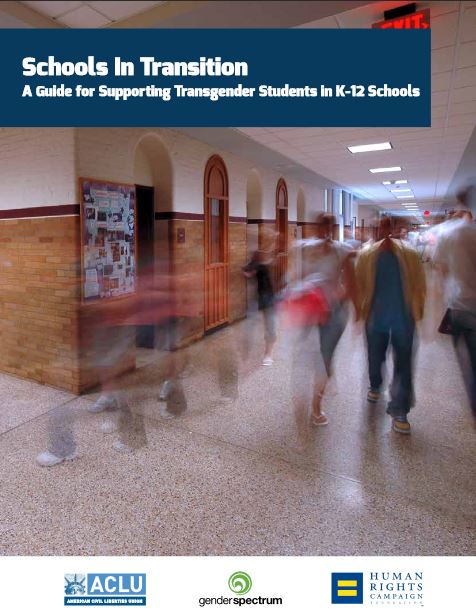 SAN FRANCISCO —Today, five national organizations introduced Schools In Transition: A Guide for Supporting Transgender Students in K-12 Schools, a first-of-its-kind publication for school administrations, teachers, and parents about how to provide safe and supportive environments for all transgender students, kindergarten through twelfth grade.
SAN FRANCISCO —Today, five national organizations introduced Schools In Transition: A Guide for Supporting Transgender Students in K-12 Schools, a first-of-its-kind publication for school administrations, teachers, and parents about how to provide safe and supportive environments for all transgender students, kindergarten through twelfth grade.
The lead authors are Asaf Orr, the Transgender Youth Project Staff Attorney for the National Center for Lesbian Rights (NCLR), and Joel Baum, Gender Spectrum’s Senior Director for Professional Development and Family Services. Other co-authors include the National Education Association (NEA), the American Civil Liberties Union (ACLU), and the Human Rights Campaign (HRC).
Schools are increasingly being called upon to include and support transgender students. Recognizing that this can seem daunting or overwhelming, Schools In Transition offers practical guidance and field-tested tips to parents, educators, administrators, and community members on planning and supporting a transgender student through a transition at school. The guide is geared toward the needs of all students, kindergarten through twelfth grade, and incorporates recommendations that will allow schools to tailor those plans to the particular circumstances of the student and school. The authors include statements, recommendations, and resources which are based on data, research and best practices that have been tested in this field, as well as narratives of real experiences from students and educators.
“Having worked with many transgender students and their families, I know that school administrators want to do what they can to meet the needs of their transgender students and comply with Title IX. Unfortunately, many are unsure about how to achieve that goal,” said Asaf Orr. “This guide changes that by giving all the stakeholders in a school the tools to support a transgender student in their school. Following this guide will not only assist schools in complying with Title IX, but also create a safe and more supportive environment for all students in the district.”
Joel Baum added: “Schools in Transition is a unique and crucial resource for educators, caregivers and students. A young person’s assertion of their authentic gender, and the attendant questions it raises can feel overwhelming for all involved. This invaluable tool effectively breaks down the process, helping convert uncertainty to action. It provides a roadmap in which everyone can locate themselves on the journey to a successful experience for all.”
“At the ACLU, I talk with trans and gender nonconforming students and their parents from all over the country all the time,” said ACLU Youth and Program Strategist Chris Hampton. “This guide answers many questions I hear almost daily, and provides practical step-by-step advice for everything from how schools should approach names and pronouns, to privacy concerns, to ways transgender students can use special education laws to get accommodations at school.”
“We could not be more proud of this partnership with other leaders dedicated to creating safe, supportive schools for transgender students,” said Ellen Kahn, head of HRC Foundation’s Children, Youth and Families Program, which includes its national Welcoming Schools effort that works with educators to create LGBT-inclusive and supportive elementary schools. “This groundbreaking publication will provide in-depth and practical guidance for school administrators, counselors, teachers, and parents–all of whom are key to ensuring that transgender children can learn and thrive at school.”
“NEA is proud to be a co-author of Schools in Transition, a first-of-its kind guide to supporting transgender students in K-12 schools,” added NEA President Lily Eskelsen Garcia. “This publication is an extremely valuable resource for the three million NEA members who work tirelessly to assure that their schools and classrooms are safe and welcoming for all students. And it will be a lifesaver for the increasing number of transgender students who are living as their authentic selves. Only when every school provides an inclusive, respectful environment can every student achieve their full potential.”
More and more transgender students of all ages are asking their families and communities to support them in living their lives authentically. Having that support in school is critical because of the central role that schools play in their lives. A negative school experience not only hinders a transgender student’s academic achievement and growth, but can also interfere with their long-term mental health. Schools In Transition helps prevent that from happening.
The guide includes:
- Information about basic concepts of gender. It is critical that those supporting a transgender or other gender-expansive child understand the complexity of gender.
- The importance of gender identity and the harm society suffers when any students are marginalized at school.
- General guidelines for meeting the needs of transgender students, including intentionality and an awareness of the trade-offs inherent in any decisions about a student’s transition.
- Specific issues affecting transgender youth, including the use of chosen names and pronouns, student confidentiality and student records, restroom and locker room access, sports and other sex-separated activities and harassment or bullying.
- Best practices for working with unsupportive parents or parents who disagree about the appropriate response to their child’s expressed gender identity. It also addresses how special education plans can be used to help transgender students.
- Overview of the legal landscape that administrators, educators, parents and students should be aware of as they work together to create a safe and supportive school environment for all students.
Download the guide here.
On Wednesday, August 12 from 2:30 -3:30 EST/11:30am-12:30pm PST, join the authors of Schools in Transition: A Guide for Supporting Transgender Students in K-12 Schools for a discussion about this unique resource. This one hour online hangout will include an overview of the document as well as an opportunity to ask questions and learn about additional resources for supporting schools to create truly welcoming environments for their transgender and gender expansive students. To participate, please click here.











